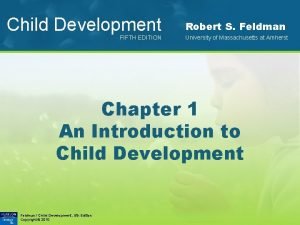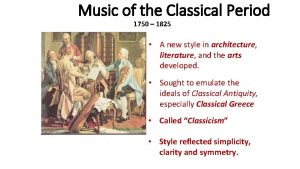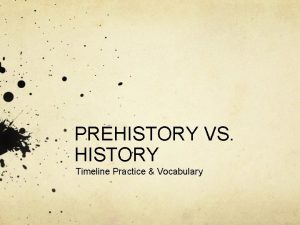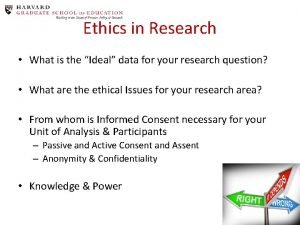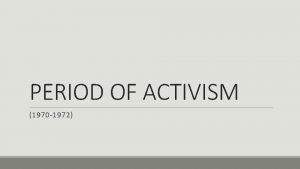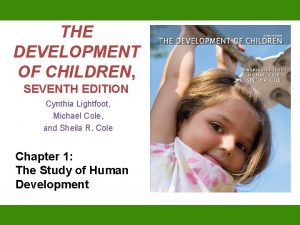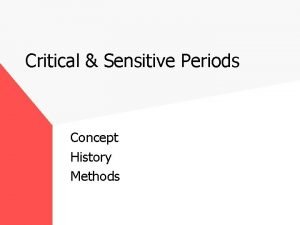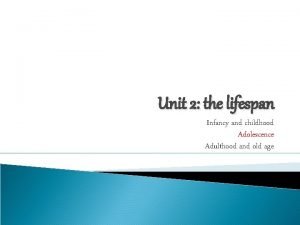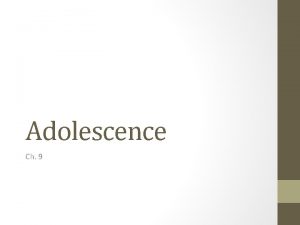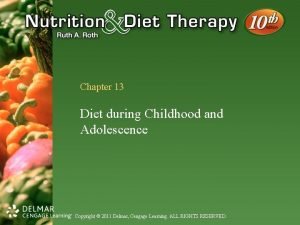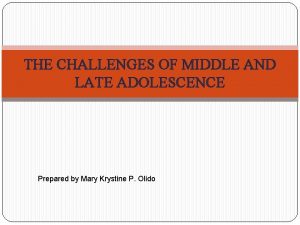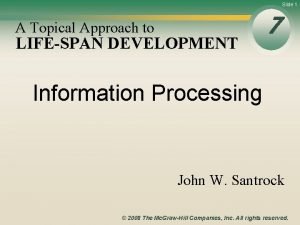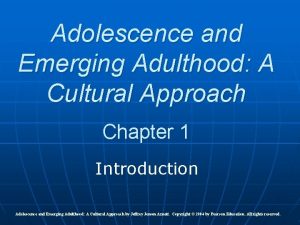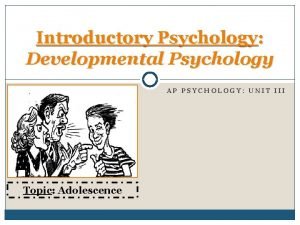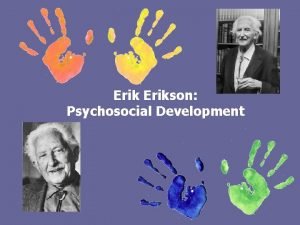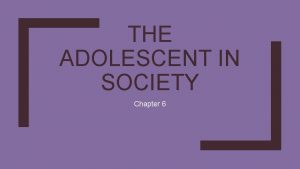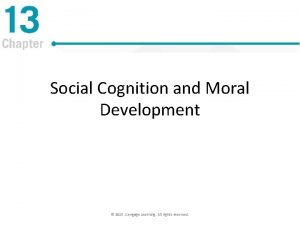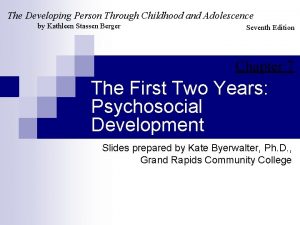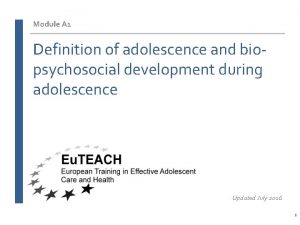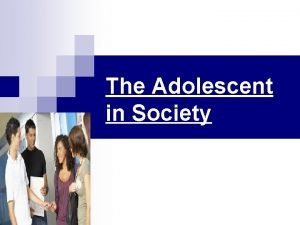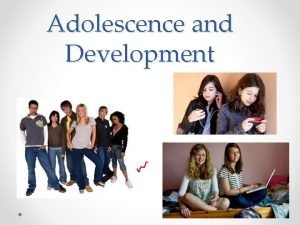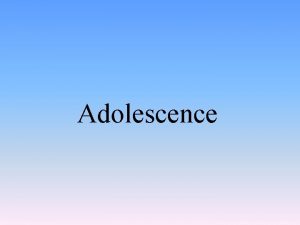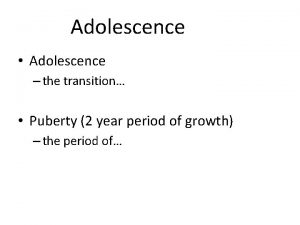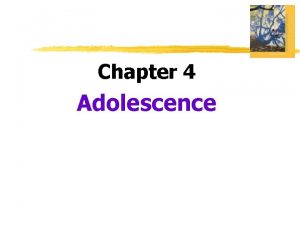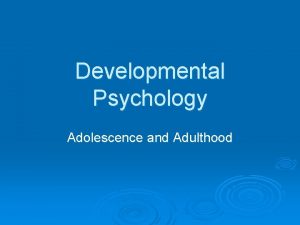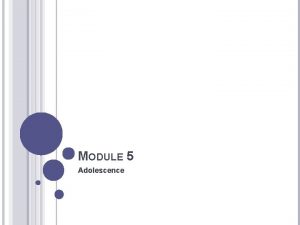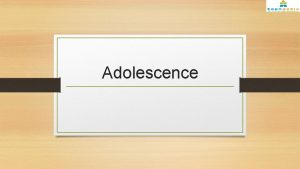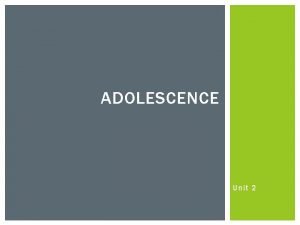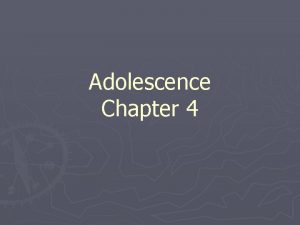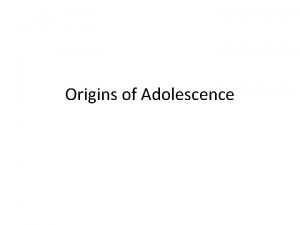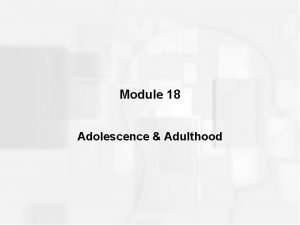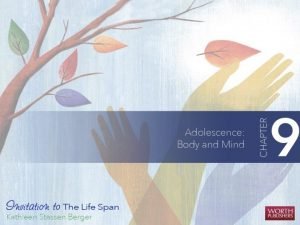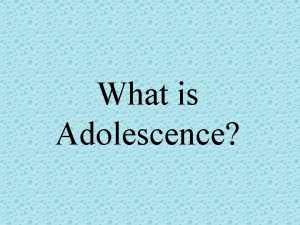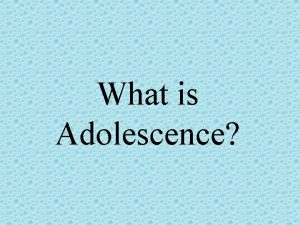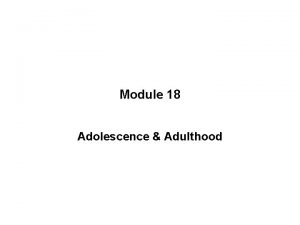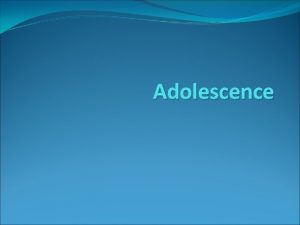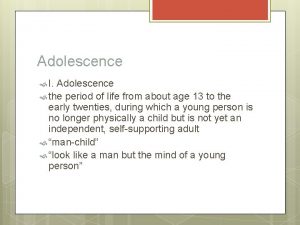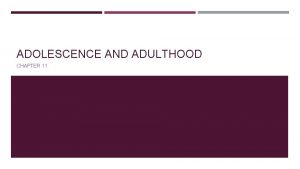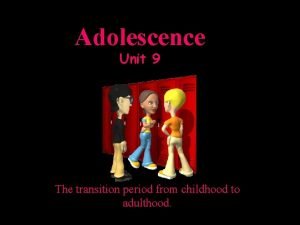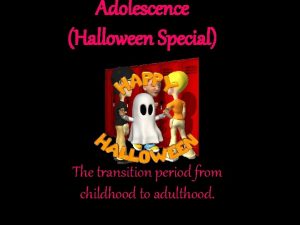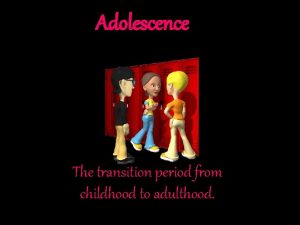Adolescence What is Adolescence Adolescence Transition period from































- Slides: 31

Adolescence

What is Adolescence?

Adolescence • Transition period from childhood to adulthood • From puberty (the start of sexual maturation) to independence

Adolescence

Physical Development in Adolescence

Puberty • The period of sexual maturation where the person becomes capable of reproducing • Starts at approximately age 11 in females and age 13 in males • Major growth spurt

Physical Development

Primary Sex Characteristics • The body structures that make sexual reproduction possible • Reproductive organs – Ovaries in females – Testes in males

Secondary Sex Characteristics • Nonreproductive sexual characteristics • Breasts and hip development in females • Voice quality and facial hair in males

Sexual Characteristics

Cognitive Development: Reasoning

Formal Operational Stage • Piaget’s fourth and final stage of cognitive development • The person can think logically, hypothetically, and in the abstract • Qualitative change over the thinking of a child

Cognitive Development in Adolescence: Morality

Lawrence Kohlberg • Author of a three-stage theory of moral development

1. Preconventional Moral Reasoning • Characterized by the desire to avoid punishment or gain reward • Typically children under the age of 9

2. Conventional Moral Reasoning • Primary concern is to fit in and play the role of a good citizen • People have a strong desire to follow the rules and laws. • Typical of most adults

3. Postconventional Moral Reasoning • Characterized by references to universal ethical principles that represent the rights or obligations of all people • Most adults do not reach this level.

Lawrence Kohlberg Moral Development

Lawrence Kohlberg Moral Development

Lawrence Kohlberg Moral Development

Social Development in Adolescence

Erikson • Created an 8 -stage theory of social development • Each stage has its own psychosocial, developmental task.




Social Development in Adolescence: Developing Identity

Identity • One’s sense of self • According to Erikson, an adolescence task is to solidify a sense of self by testing and integrating various roles • A strong, consistent sense of who and what a person is

Developing Identity • Identity search includes the following characteristics: – Experimentation – Rebellion – “Self”-ishness – Optimism and energy

Social Development in Adolescence: Developing Intimacy

Intimacy • In Erikson’s theory, the ability to form close, loving, open relationships • To Erikson this is the primary task of early adulthood • Not necessarily one’s spouse or a sexual relationship

The End
 Adolescence period meaning
Adolescence period meaning Nonmetal period 3 atomic mass 32
Nonmetal period 3 atomic mass 32 Stability period vs measurement period
Stability period vs measurement period A&p flix activity: propagation of an action potential
A&p flix activity: propagation of an action potential Critical period vs sensitive period
Critical period vs sensitive period Trustee period and royal period
Trustee period and royal period Is hyperpolarization the same as refractory period
Is hyperpolarization the same as refractory period Classic period
Classic period Difference between historic period and prehistoric period
Difference between historic period and prehistoric period Critical period vs sensitive period
Critical period vs sensitive period Important key points of period of activism
Important key points of period of activism The development of children 7th edition
The development of children 7th edition Critical period
Critical period Needs of adolescence
Needs of adolescence Section quiz 4-2 personal development
Section quiz 4-2 personal development Developmental tasks for adolescent
Developmental tasks for adolescent Eating a balanced diet during childhood and adolescence
Eating a balanced diet during childhood and adolescence Moral development in adolescence
Moral development in adolescence Chapter 4 adolescence psychology
Chapter 4 adolescence psychology Challenges of middle and late adolescence
Challenges of middle and late adolescence Critical thinking in adolescence
Critical thinking in adolescence Jeffrey arnett emerging adulthood theory
Jeffrey arnett emerging adulthood theory The developing person through childhood 7th edition
The developing person through childhood 7th edition Adolescence ap psychology
Adolescence ap psychology Autonomy vs. shame and doubt
Autonomy vs. shame and doubt Developmental tasks for adolescent
Developmental tasks for adolescent Moral development in adolescence
Moral development in adolescence Social changes in adolescence
Social changes in adolescence The developing person through childhood and adolescence
The developing person through childhood and adolescence Late adolescence
Late adolescence Dating serves several important functions that include
Dating serves several important functions that include Adolescence
Adolescence




